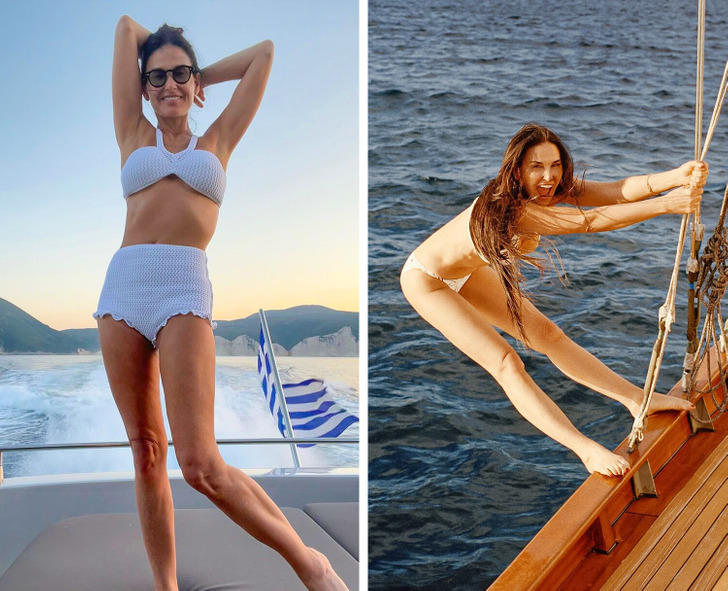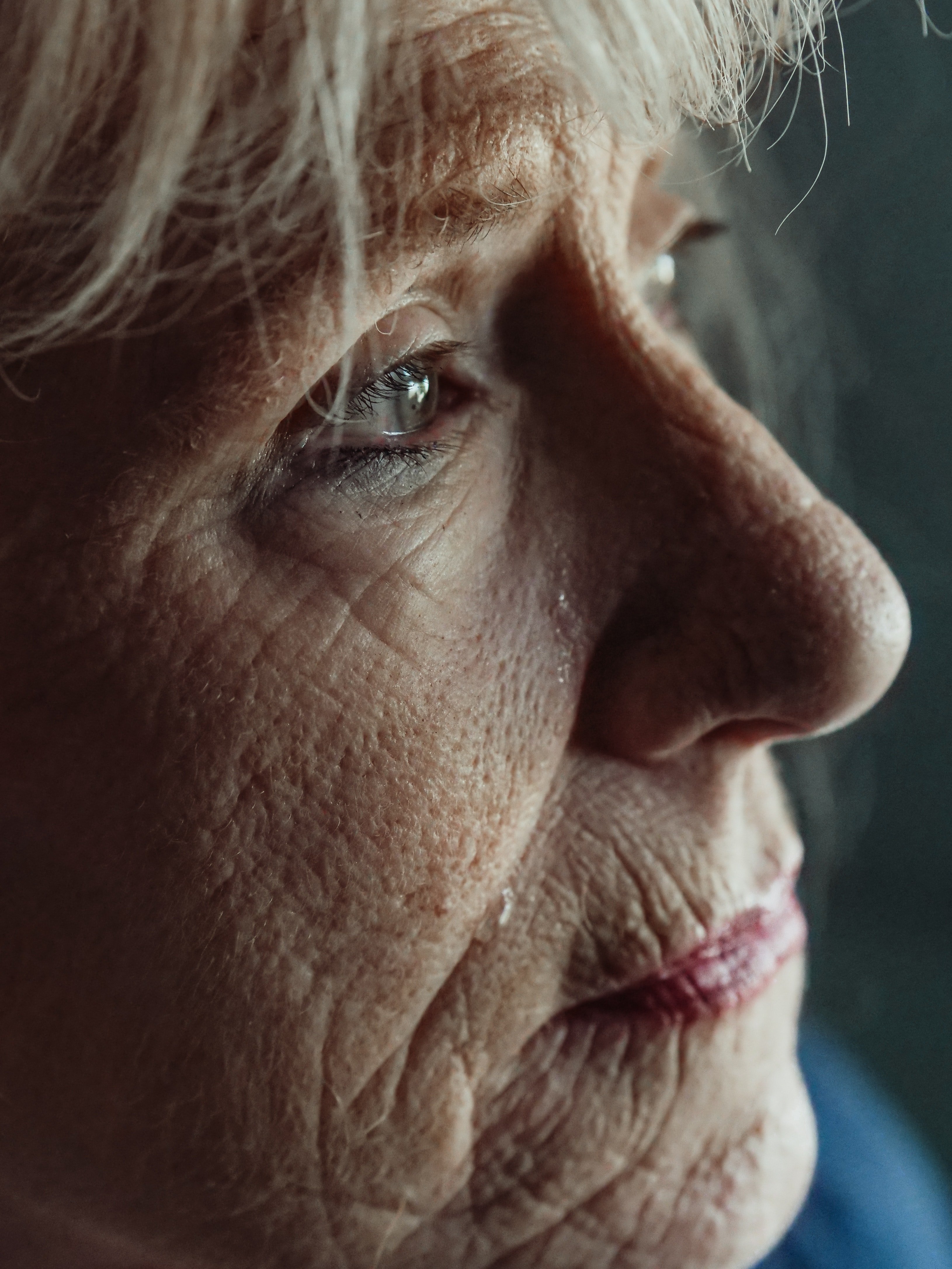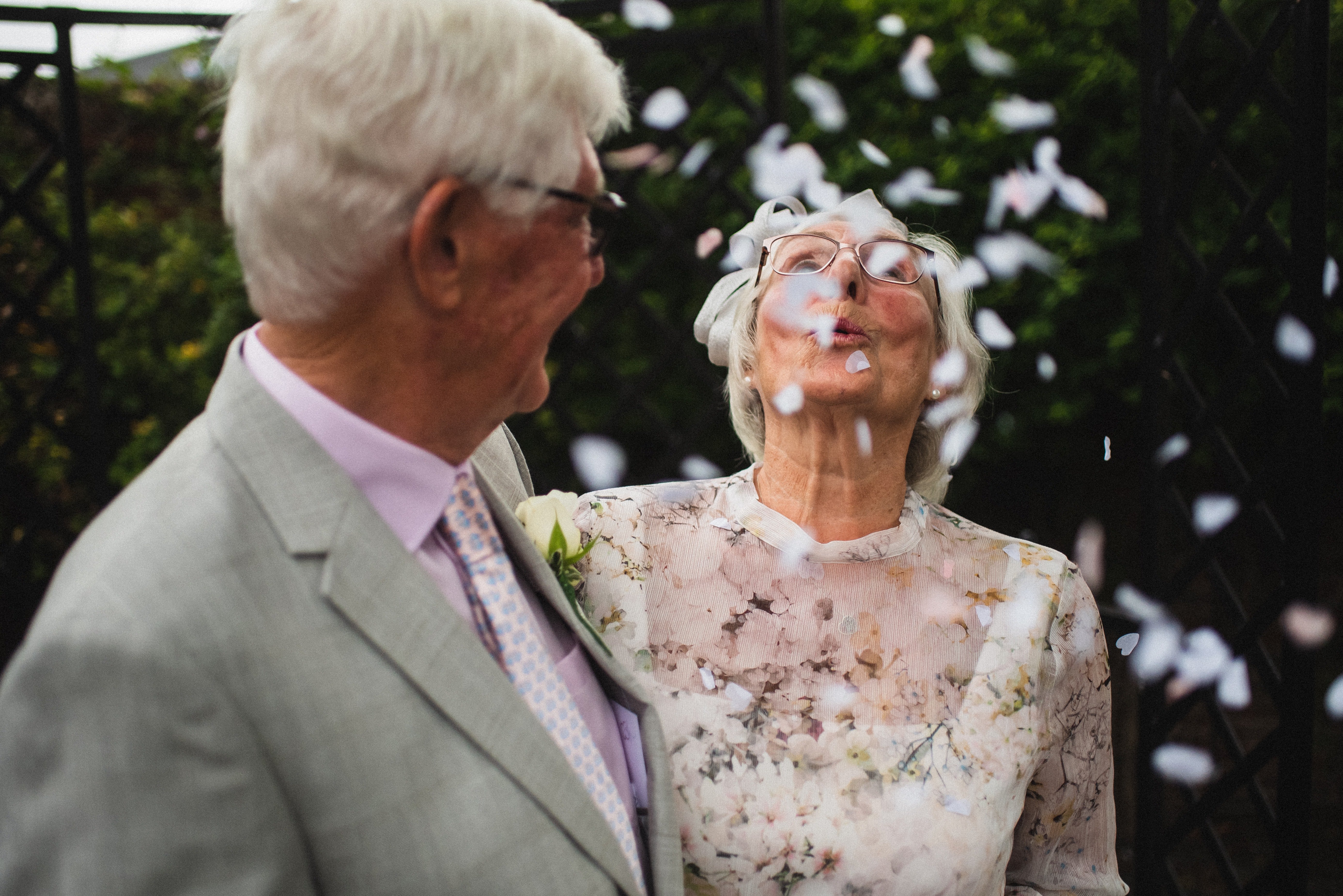Even at the age of 60, Demi Moore, still looks stunning in swimsuits. While her appearance may seem like a mystery, Moore reveals her secrets lie in the power of self-care and cultivating a positive mindset. By placing a high value on her physical and mental well-being, the actress continues to radiate confidence and beauty.
She works out at home.

Many people choose to exercise at home instead of going to the gym, saving themselves the hassle of long commutes. It seems that Moore’s usual fitness routine isn’t as gym-centric as we thought.
In 2019, she admitted that she hadn’t been to the gym in over four years. On her Instagram, she shared her experience with The Mirror, a fitness system, and started her fitness journey with a short 15-minute dance-cardio session. “I haven’t exercised in, like, over four years. So, this is gonna be my next jam,” she shared.
She swims a lot.

Moore is often seen enjoying her time near the water, as evidenced by the numerous photos she shares on Instagram. “Cooling off in the Tropez suit,” she captioned some pictures of herself in a pool.
Swimming is widely recognized as an excellent form of exercise that not only helps tone muscles but also enhances strength and endurance. It’s no wonder Moore chooses to incorporate swimming into her fitness routine.
She spends a lot of time with her dog.

Moore has an adorable dog named Pilaf, and she loves sharing pictures and videos of him on Instagram. They do lots of fun things together, and recently, she posted a heartwarming video of them having a great time at the beach. The caption said, “Swimming lessons with Pilaf!”
Numerous studies have shown that owning a dog has many health benefits, like getting you more active and even helping to lower your blood pressure.
She believes beauty starts from within.

During a Goop panel discussion alongside fellow celebrity Gwyneth Paltrow, Moore shared her top skincare advice, emphasizing the importance of self-care from within.
“Look, I don’t have any super big secret. But I definitely think beauty starts on the inside. You can do anything you want to the outside, but if the inside isn’t looking or feeling good, then I don’t know if anything you do on the outside is going to be good enough,” she said.
After going through a string of challenging relationships and marriages, Demi Moore has reached a significant realization: before she can genuinely love someone else, she must prioritize loving herself completely and honoring her own desires. Now, at the age of 60, love has once again found its way into Moore’s life, and this time around, she is resolute in approaching it with a renewed outlook and making alternative decisions.
Preview photo credit demimoore / Instagram
On Their 50th Anniversary, Husband Comes Home & Sees That His Wife Has Put All His Belongings Out on the Street

A woman is angry and hurt when her husband forgets their 50th wedding anniversary and throws his belongings in the gutter — until he comes home with an unusual excuse.
Betty Carmichael was sure her husband had forgotten their anniversary yet again, only this time she wasn’t going to take it lying down. She had been married to Donald for fifty years and she deserved better!
She had stood by his side through thick and thin and given him three children and the best years of her life, and what did she get? Not even a bouquet of ratty daisies, let alone red roses.

Donald hadn’t brought Betty flowers in years. | Source: Pexels
Betty looked at the wall clock and frowned. 21:30. He hadn’t even bothered to come home for the special dinner she’d prepared! This was the last straw!
Trust is the cornerstone of any relationship, and doubt wears away at the love that holds it together.
Two hours later, Betty heard her husband’s car pull into the driveway and smiled grimly. Donald wasn’t going to enjoy his evening, not one little bit.
She immediately heard a shout: “BETTY! What is going on here!”
She marched outside and stood on the porch, her fists on her hips. “What do you want?” she asked.

Betty prepared a romantic dinner but Donald didn’t come home. | Source: Unsplash
Donald was standing in the garden and he looked very angry. He pointed a finger at an old worn-out recliner sitting on the lawn along with several boxes of books and bric-a-brac.
“What are my things doing out on the lawn?” he asked. “Have you run mad, woman?”
“Mad!” screamed Betty, and the lights went on in the house next door. “You are the one who must be mad! Do you have Alzheimer’s or amnesia? I’m kicking you out. I’m divorcing you!”
“Divorcing me?” gasped Donald, flabbergasted. “I’m seventy-eight years old and you’re seventy-five and you want a DIVORCE?”
“Yes!” cried Betty angrily. “Do you think that just because I’m seventy-five I’m no longer a woman? That you can take me for granted? Well, I won’t let you!”

Betty was sure Donald didn’t love her anymore. | Source: Pexels
“Betty,” Donald said. “Be reasonable. What is this all about?”
“You forgot our anniversary AGAIN!” Betty said angrily. “We’ve been together for fifty years and I have to remind you of my birthday. I understand you weren’t there, but you were definitely there for the wedding!”
“Bets,” Donald protested. “That was the happiest day of my life…”
“Then why don’t you remember it?” Betty asked. “Why don’t you bring me flowers or take me dancing? You don’t love me anymore. You haven’t loved me in years.”
Donald shook his head. “I love you, Betty,” he said. “You are the love of my life…”

Betty brought Donald’s favorite chair out in the street. | Source:Source: Unsplash
“Then why didn’t you come home for dinner?” Betty asked. “I made a special dinner and lit candles and set out flowers and you didn’t show up! Where were you? Out with another woman?”
Donald grinned. “Yes,” he said and stepped aside. Standing there was a slim girl in her twenties with Betty’s blue eyes and Donald’s wide smile.
“Hannah!” Betty cried and ran down the steps. She would have fallen if Donald hadn’t caught her. She threw her arms around the girl and started crying.
“Oh, Hannah,” she sobbed. “It’s been too long! I’ve missed you so much!”

Hannah came to visit her grandparents. | Source: Unsplash
“Hi, Gran Betty,” Hannah said. “I’m sorry we were so late, but my flight was delayed. Poor Gran Donald waited for hours!”
Betty turned to her husband. “You knew she was coming and you didn’t tell me?” she protested.
“I didn’t KNOW,” Donald said triumphantly. “I arranged it! It was supposed to have been your anniversary surprise, but the flight was late… You’ve been complaining about how much you miss your only grandchild, so I sent her a plane ticket!”
“Oh, Don!” Betty cried, and put her arms around her husband. “I’m sorry! I thought… I started thinking crazy things…”

Donald and Betty renewed their vows. | Source: Unsplash
“Betty,” Donald said tenderly. “I haven’t looked at another woman in fifty years and I’m not about to start now.”
“Donald,” Betty said. “What did I do to deserve you?”
“I don’t know,” Don said. “But I can tell you we’re going to have a hell of a time getting all my stuff back in the house where it belongs!”
With Hannah’s help, Don and Betty got everything tidied up and sat down for a midnight snack. “By the way,” Donald said. “I have another surprise for you. Tomorrow night we’re having a party with all our children and all our friends. I’ve arranged for Father Bartholomew to be there so we can renew our vows.”

Betty and Donald had a wonderful anniversary party. | Source: Unsplash
“But what am I going to wear?” gasped Betty.
“I don’t know about the dress, but I have a ring!” Don said, then he dropped down to one knee and pulled out a little jewelry box. “Betty Delancy Carmichael, will you marry me again?”
The next day, the Carmichaels celebrated their fiftieth wedding anniversary in style and Betty looked lovely in a pretty cream suit and a little veil. As Donald kissed her, she vowed never to doubt him again as long as she lived.
What can we learn from this story?
- Trust is the cornerstone of any relationship, and doubt wears away at the love that holds it together. Betty started imagining that Don didn’t love her anymore, and didn’t realize he had a sweet surprise for her.
- Marriage is about every single day, not just the special occasions. Betty forgot that Don was there for every difficult day and stood by her through thick and thin.
Share this story with your friends. It might brighten their day and inspire them.
If you enjoyed this story, you might like this one about a man who was shocked and hurt when his wife of thirty years asked for a divorce even though he’d always been a faithful husband.
This account is inspired by our reader’s story and written by a professional writer. Any resemblance to actual names or locations is purely coincidental. All images are for illustration purposes only. Share your story with us; maybe it will change someone’s life.



Leave a Reply